|
|
|
Sort Order |
|
|
|
Items / Page
|
|
|
|
|
|
|
| Srl | Item |
| 1 |
ID:
124141
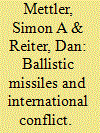

|
|
|
|
|
| Publication |
2013.
|
| Summary/Abstract |
Governments are concerned about the dangers posed by ballistic missiles. However, there is almost no theoretical or empirical scholarship on ballistic missiles. This article presents and tests the conventional wisdom that the spread of ballistic missiles makes conflict more likely. Original data on ballistic missiles and on crisis initiation is collected, and analysis using a variety of statistical models is conducted. It is found that among all directed dyads from 1946 to 2007, potential challengers possessing ballistic missiles are significantly more likely to initiate international crises. Further, potential targets armed with ballistic missiles are significantly less likely to be challenged. Crises are less likely to escalate when targets are armed with missiles. The results are obtained after accounting for several control variables. Analysis reveals that the findings are not affected by possible endogeneity bias. The analysis also reveals complex interactive effects between ballistic missiles and nuclear weapons on the onset of international crises.
|
|
|
|
|
|
|
|
|
|
|
|
|
|
|
|
| 2 |
ID:
186322
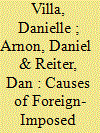

|
|
|
|
|
| Summary/Abstract |
Why do major powers attempt foreign-imposed regime change (FIRC)? This article builds on existing security theory, proposing that a major power looks for signals that a government might exit that major power’s international hierarchy and/or enter an adversary’s hierarchy. Major powers are more likely to attempt FIRC against states that signal shifting preferences. The article tests the theory on American FIRC attempts from 1947 to 1989, covert and overt, failed and successful, proposing that when a hierarchy member or neutral state engaged in economic expropriation, this signaled possible exit from the US hierarchy and/or entry into the Soviet hierarchy, making a US FIRC attempt against that state more likely. It also presents an alternative theory, that economic special interests drove US FIRC attempts. Using new data on expropriations, the article supports the security theory, as expropriations by US hierarchy members made FIRC attempts more likely, but does not support the special interests theory.
|
|
|
|
|
|
|
|
|
|
|
|
|
|
|
|
| 3 |
ID:
186091
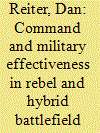

|
|
|
|
|
| Summary/Abstract |
Conventional thinking frames battlefield coalitions as collections of national armies fighting together as multinational coalitions. However, wars also include rebel groups fighting together as coalitions, and rebel groups fighting alongside states in hybrid coalitions. This paper seeks to better understand rebel and hybrid battlefield coalitions, focusing on command and operational military effectiveness. The paper first presents basic ideas about coalition command and military effectiveness from conventional wisdom on multinational coalitions. It then builds on these ideas to explore potential similarities and differences between multinational coalitions on one hand and rebel and hybrid coalitions on the other. In particular, the paper focuses on the nature of different command structures, the varying operational military effectiveness advantages for unified coalition command, and the political motivations for coalition members to resist creating unified command, despite potential effectiveness benefits. The paper concludes by providing policy recommendations to states who lead hybrid coalitions.
|
|
|
|
|
|
|
|
|
|
|
|
|
|
|
|
| 4 |
ID:
116240
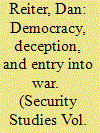

|
|
|
|
|
| Publication |
2012.
|
| Summary/Abstract |
Realists propose that elected leaders that seek war but face a hesitant public may use deception to build public support for war. Leaders may secretly make provocative diplomatic or military moves to push the adversary to attack first, rallying the public behind a war effort seen as defensive, or publicly exaggerate the threat posed by the adversary. This paper develops a liberal institutionalist critique of this theory, positing that elected leaders are deterred from engaging in such deception because democratic political institutions such as political competition, a professionalized military, and the marketplace of ideas increase the likelihood that such moves will be exposed, and once exposed, deceptive politicians will suffer domestic political punishment. The paper examines the thesis that Franklin Roosevelt sought to provoke Germany and Japan to war in 1941, finding little support. It also finds that in general autocratic leaders are more likely than elected leaders to deceive.
|
|
|
|
|
|
|
|
|
|
|
|
|
|
|
|
| 5 |
ID:
076885
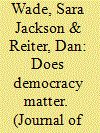

|
|
|
|
|
| Publication |
2007.
|
| Summary/Abstract |
This article conducts quantitative tests on the relationship between regime type and suicide terrorism for 1980 to 2003. We present the recently popularized argument that democracies are more likely to experience suicide terrorism and a new hypothesis that mixed regimes are especially likely to experience suicide terrorism. We offer several improvements in research design, including using more controls, the nation-year as the unit of analysis, and more appropriate statistical techniques. Using both Freedom House and Polity data, we find that in general, regime type is uncorrelated with suicide terrorism. We do find that there is a statistically significant interaction between regime type and the number of religiously distinct minorities at risk (MARs) with suicide terrorism, but the statistical significance of this finding is limited, and its substantive impact is marginal. We also find that national size, Islam, national experience with suicide terrorism, and global experience with suicide terrorism affect the likelihood of suicide terrorism
|
|
|
|
|
|
|
|
|
|
|
|
|
|
|
|
| 6 |
ID:
107922


|
|
|
|
|
| Publication |
2011.
|
| Summary/Abstract |
The authors analyze a bargaining model of war that incorporates both commitment problems due to shifting power and asymmetric information. Four results emerge when both bargaining problems are present. First, in contrast to asymmetric information models, the resolution of uncertainty through fighting can lead to the continuation of war rather than its termination. Second, wars can be less-not more-likely to end in settlement the longer they last. Third, war aims increase over time as a belligerent becomes more confident that its opponent will grow unacceptably strong in the future. Finally, the dynamics that characterize wars in purely asymmetric information or commitment models should exist only when the other factor is absent.
|
|
|
|
|
|
|
|
|
|
|
|
|
|
|
|
| 7 |
ID:
162770
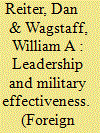

|
|
|
|
|
| Summary/Abstract |
What determines military effectiveness? Though political scientists have studied the sources of military effectiveness, they have generally ignored the role of military leadership, a factor that historians have emphasized as crucial for effectiveness. This article presents the first rigorous examination of the proposition that militaries improve effectiveness by replacing low-performing leaders. The article tests three theories describing how militaries promote and demote leaders: (1) military leaders are promoted and demoted on the basis of combat performance; (2) political leaders fearful of coups do not demote low-performing military leaders, as a coup-proofing tactic; and (3) military leaders that belong to powerful interpersonal networks are less likely to be demoted and more likely to be promoted. Hypotheses are tested using new data on all American and German generals holding combat commands in the North African, Italian, and West European theaters in World War II and new data on the monthly combat performance of American and German divisions in these theaters. Analysis reveals that both armies replaced low-performing generals (coup-proofing motives did not prevent Hitler from demoting low performers) and that interpersonal networks in the US army did not block demotion of low performers. Also, the replacement of low-performing generals improved combat effectiveness in both armies.
|
|
|
|
|
|
|
|
|
|
|
|
|
|
|
|
| 8 |
ID:
141709
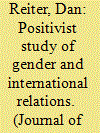

|
|
|
|
|
| Summary/Abstract |
Up until about 2000, most of the work on gender and international relations (IR) was nonpositivist in nature. Since 2000, there has been a burst of positivist gender/IR scholarship, much of it quantitative. This work has addressed several important areas in IR, including terrorism, interstate war, human rights, civil war, violence against civilians, public opinion, international norms, globalization, and others. Much of this work has developed new data, advanced theory, and employed rigorous empirical methods. This article surveys this positivist scholarship. It discusses how positivist and nonpositivist gender/IR work complement each other. This article makes recommendations about directions for future scholarship on gender and IR.
|
|
|
|
|
|
|
|
|
|
|
|
|
|
|
|
| 9 |
ID:
068713
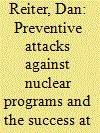

|
|
|
| 10 |
ID:
147318
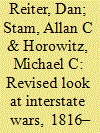

|
|
|
|
|
| Summary/Abstract |
Interstate war data are critical for many important research areas in international relations. Scholars working in these areas frequently rely on the Correlates of War (COW) interstate war data. This article analyzes the COW interstate war data version 4.0, covering the years 1816 through 2007. Using COW coding criteria, the article finds that in more than 30 percent of the ninety-five COW interstate wars, codings of at least one of the key variables—existence of the war, list of participants, initiator, and outcome—needs to be revised. This article describes a revised data set on interstate wars that incorporates these revisions. The data set includes a metric for breaking apart large, multilateral wars such as the World Wars into component wars. For each participant in multilateral wars, it provides information on exactly which states that participant fought, and specific initiation and outcome codings for that participant.
|
|
|
|
|
|
|
|
|
|
|
|
|
|
|
|
| 11 |
ID:
131056
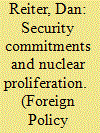

|
|
|
|
|
| Publication |
2014.
|
| Summary/Abstract |
This article develops a theory connecting security commitments and the decision to acquire nuclear weapons. In a threatening environment, third party security commitments can reduce a state's fear of abandonment in the event of war and its motive for acquiring nuclear weapons. However, a threatened state may reject at least some kinds of security commitments, such as foreign deployed nuclear weapons, if it fears that such commitments increase the risks of entrapment, the possibility that the threatened state will be dragged into a war it would like to avoid. The article looks at three kinds of security commitments, alliances, foreign deployed nuclear weapons, and foreign deployed troops. In quantitative tests, it finds strong evidence that foreign deployed nuclear weapons reduce proliferation motives, only very limited evidence that alliances reduce proliferation motives, and no evidence that foreign deployed troops reduce proliferation motives. It also presents several qualitative evidence, which supports the quantitative evidence, and in particular helps explain why alliance ties sometimes do not prevent proliferation.
|
|
|
|
|
|
|
|
|
|
|
|
|
|
|
|
| 12 |
ID:
058796
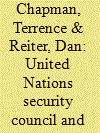

|
|
|
|
|
|
|
|